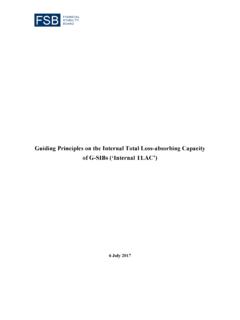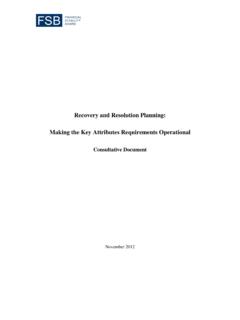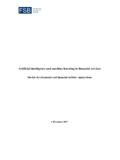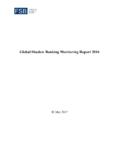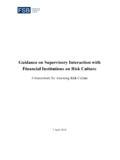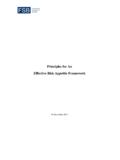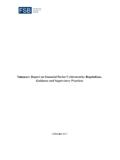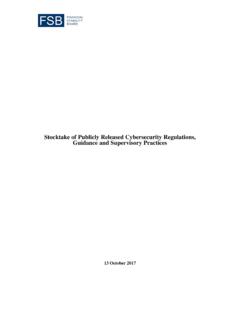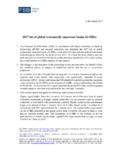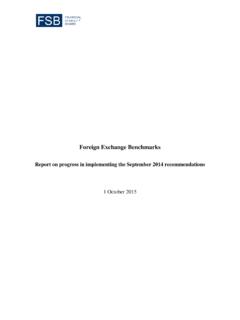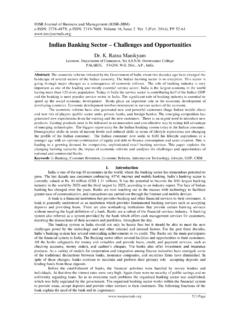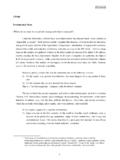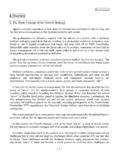Transcription of Measures to reduce misconduct risk - Financial …
1 Measures to reduce misconduct risk Progress Report 6 November 2015. Table of Contents Page Executive Summary .. 1. I. The role of incentives in reducing misconduct in markets and institutions .. 2. 1. Compensation structures .. 3. 2. Governance and culture .. 4. 3. Enforcement powers of banking regulators and supervisors .. 6. Action points on the role of incentives 6. II. International coordination on conduct in FICC markets .. 7. 1. Standards of market practice .. 7. 2. Financial benchmarks .. 9. Interest rate benchmarks 9. FX benchmarks 10. Additional IOSCO workstreams 11. III. Coordination in the application of conduct regulation and need for credible deterrence .. 11. Annex I Conduct risk workplan action items and timetable .. 13. Annex II FSB Roundtable on the Effectiveness of Governance Frameworks to Address Conduct risks .
2 15. Annex III Key findings from the FSB questionnaire on banking regulators' enforcement powers against misconduct by individuals .. 19. iii Measures to reduce misconduct risk Progress report Executive Summary The FSB Chair's letter 1 to the February G20 Finance Ministers and Central Bank Governors meeting stated that the FSB will coordinate efforts to address emerging vulnerabilities from misconduct , noting that the scale in some Financial institutions has risen to a level that has the potential to create systemic risks and undermine trust in Financial institutions and markets. The implications of such misconduct can be far-reaching, contributing to Financial exclusion, and limiting the potential of finance to serve real economies and foster global economic growth.
3 The use of fines and sanctions acts as a deterrent to misconduct , but preventative approaches are also needed that can mitigate the risk of misconduct through improved market organisation, structure and behaviour of market actors. Addressing the issue calls for a multifaceted approach. The FSB agreed in early 2015 a workplan on Measures to reduce misconduct risk, which was sent to the June G20 Deputies meeting, to examine: whether the reforms to incentives, for instance to risk governance and compensation structures, are having sufficient effect on reducing misconduct and whether additional Measures are needed to strengthen disincentives to misconduct ;. the progress of ongoing reforms to benchmarks, and whether steps are needed to improve global standards of conduct in the fixed income, currency and commodities (FICC) markets.
4 Whether there are ways that authorities could enhance coordination in the application of conduct regulation and the need for credible deterrence; and together with the World Bank and other relevant bodies, the extent of potential withdrawal from correspondent banking, its implications for Financial exclusion, as well as possible steps to address this issue. This report provides a summary of progress made so far and planned next steps across the first three streams. A separate report examines the extent of potential withdrawal from correspondent banking and the actions being taken to address that issue, which has implications for Financial inclusion, as well as for the addressing of misconduct . 2. The future actions planned for these three workstreams are as follows (with timelines specified in Annex I): 1.
5 Role of incentives in reducing misconduct FSB to establish a working group to exchange good practices on the use of governance frameworks to address misconduct risks with a view to potentially developing a 1. 2. See 1. supervisory tool kit or guidelines, taking into account the work of the standard setting bodies. FSB to facilitate sharing of national experiences on the role of bank regulators' (and possibly other regulators') enforcement powers in addressing misconduct by individuals. FSB to further examine the use of compensation tools such as malus and clawbacks and the use of different instruments as an element of deferred compensation and if appropriate make recommendations on better practices. 2. International coordination on conduct in FICC markets BIS Markets Committee to finalise its FX Code of conduct standards and principles, and proposals to ensure greater market adherence than to existing codes.
6 FSB to publish a report on further progress in implementing the work plan on interest rate benchmarks. IOSCO to publish its final report on its follow-up review of key interest rate benchmark administrators. IOSCO to conduct a follow-up review of major global FX benchmark providers. IOSCO to publish its report to further strengthen the current global framework to address misconduct by firms and individuals in professional markets. 3. Coordination in the application of conduct regulation and need for credible deterrence Senior officials from prudential and conduct Financial authorities on an ongoing basis to share information on their respective powers and approaches to the supervision and enforcement of conduct rules. A timetable of these action items is attached as Annex I.
7 In addition, as part of its ongoing work to address new and emerging risks and vulnerabilities, the FSB will continue to keep under review whether there are any additional misconduct issues with the potential to create systemic risks that should be addressed. I. The role of incentives in reducing misconduct in markets and institutions A number of post-crisis reforms are aimed, amongst other things, at strengthening incentives for good conduct. FSB jurisdictions have done much already to implement agreed reforms. Nevertheless, in light of continuing cases of misconduct , the FSB has been reviewing whether the reforms to incentives have had their intended effect on conduct with a view to, if necessary, making proposals to reinforce or supplement the reforms to support effective implementation by jurisdictions.
8 This section summarises three areas of work undertaken by the FSB to examine the role of incentives in reducing misconduct : 2. Analysis of the role of compensation standards and rules in incentivising appropriate conduct, undertaken as part of the FSB overall monitoring of the implementation of the FSB Principles and Standards on Sound Compensation Practices;. Outcomes of an FSB roundtable on the effectiveness of governance frameworks in addressing misconduct risk; and A stocktake of the enforcement powers of banking regulators in FSB member jurisdictions against misconduct by individuals. 1. Compensation structures Compensation structures are important not only to provide incentives for sound risk taking but also to disincentivise misconduct cases. The FSB agreed Principles and Standards for Compensation Practices 3 in 2009, and monitors implementation of through its Compensation Monitoring Contact Group (CMCG).
9 The FSB's fourth progress report on implementation, published in November 2015, 4 concluded that almost all FSB jurisdictions have now fully implemented the Principles and Standards for banks. As part of its monitoring, the CMCG's annual questionnaire on the implementation of the Principles and Standards in 2015 included a section dedicated to compensation and conduct, exploring (i) the extent to which employees' performance assessment and compensation take into account compliance with regulation, firm guidance and other conduct issues; (ii) the role of the Board of Directors and the governance of compensation structures for conduct purposes; (iii) the conduct profiles and triggers taken into account in performance measurement indicators; and (iv) the use of malus and clawback clauses in addressing conduct.
10 The responses to the questionnaire indicate that the overall level of implementation of the Principles and Standards by firms is generally assessed by their supervisors as high, although with some challenges in the areas of governance and risk alignment, and in the application of malus and clawback clauses. The FSB held roundtables in April and May 2015, with the banking and the insurance industry respectively. 5 The roundtables focused among other things on the role of compensation in incentivising conduct. One of the findings of the roundtables was that boards are increasingly focusing on conduct issues, consistent with their fiduciary responsibility. Members of boards are asking whether risk-takers understand what the firm expects of them, what conduct issues should impact compensation, and where and how to draw the lines in terms of which individuals should be held accountable and what the right impact on compensation should be.
